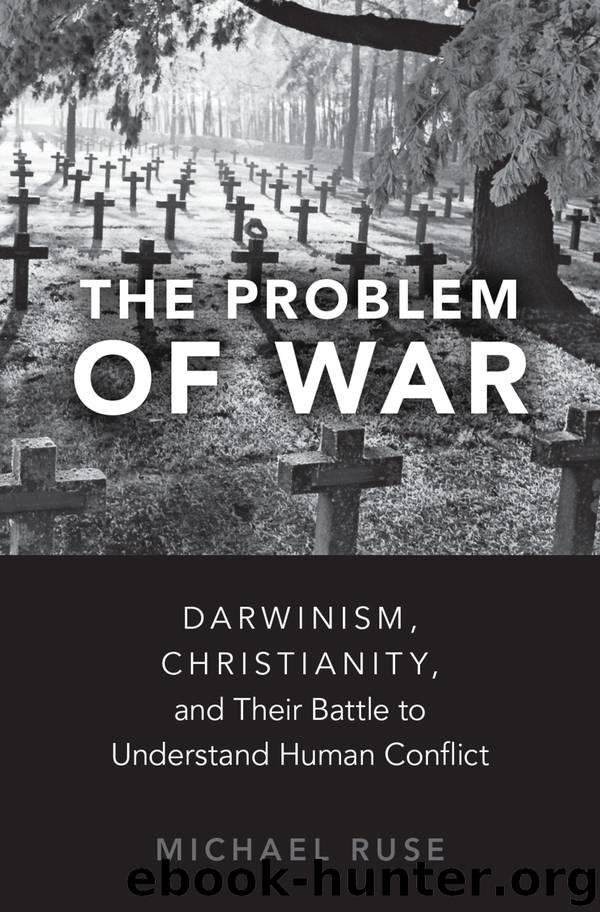The Problem of War by Michael Ruse

Author:Michael Ruse
Language: eng
Format: epub
Publisher: Oxford University Press
Published: 2018-03-13T16:00:00+00:00
Fundamentalism
Expectedly, not all interwar pacifists thought alike. Fosdick was a liberal thinker, who was comfortable with science; and in particular was an enthusiast for evolution, although it seems clear that it was some kind of theistic form, where God has a hand in seeing that not all is blind and undirected. The evolution of humankind did not happen by chance. Expectedly, after the First World War, with the rise of Fundamentalism, Fosdick sailed into turbulent waters. William Jennings Bryan, the “Great Commoner,” three times Democratic candidate for the presidency, was in 1913 appointed Secretary of State by then-president Woodrow Wilson. He resigned a couple of years later, when Wilson reacted harshly toward Germany at the sinking of the Lusitania, causing the deaths of 1,198 passengers and crew, of whom 128 were American citizens. After the War, with one of Bryan’s targets, alcohol, now banned, thanks to a constitutional amendment enacting prohibition, he turned to his other main target, evolution. Bryan had read and been much moved by Vernon Kellogg’s Headquarters Nights. In particular, he was appalled at the supposed Darwinian thinking of the German general staff. “The creed of the Allmacht of a natural selection based on violent and fatal competitive struggle is the gospel of the German intellectuals; all else is illusion and anathema.” Continuing (and still speaking in the voice of his presumed German thinkers): “But as with the different ant species, struggle—bitter, ruthless struggle—is the rule among the different human groups. This struggle not only must go on, for that is the natural law, but it should go on, so that this natural law may work out in its cruel, inevitable way the salvation of the human species.” Salvation is bound up with evolution, and that of its most “desirable” form. “That human group which is in the most advanced evolutionary stage as regards internal organization and form of social relationship is best, and should, for the sake of the species, be preserved at the expense of the less advanced, the less effective” (Bryan 1919, 303). The winners can and should impose their “Kultur” on the rest of us.
For the five years remaining in his life, Bryan lectured and wrote extensively against the vile science on which this kind of thinking is based. He found fault with Darwinism as science. “While ‘survival of the fittest’ may seem plausible when applied to individuals of the same species, it affords no explanation whatever, of the almost infinite number of creatures that have come under man’s observation. To believe that natural selection, sexual selection or any other kind of selection can account for the countless differences we see about us requires more faith in chance than a Christian is required to have in God.” Of course, it was never evolution as such that scared people like Bryan. If warthogs had had proto-warthogian ancestors, he could have lived with that. It was humankind that was at real issue. “Is it conceivable that the hawk and the hummingbird, the spider and the
Download
This site does not store any files on its server. We only index and link to content provided by other sites. Please contact the content providers to delete copyright contents if any and email us, we'll remove relevant links or contents immediately.
The remains of the day by Kazuo Ishiguro(8962)
Tools of Titans by Timothy Ferriss(8359)
Giovanni's Room by James Baldwin(7313)
The Black Swan by Nassim Nicholas Taleb(7097)
Inner Engineering: A Yogi's Guide to Joy by Sadhguru(6782)
The Way of Zen by Alan W. Watts(6589)
Asking the Right Questions: A Guide to Critical Thinking by M. Neil Browne & Stuart M. Keeley(5751)
The Power of Now: A Guide to Spiritual Enlightenment by Eckhart Tolle(5741)
The Six Wives Of Henry VIII (WOMEN IN HISTORY) by Fraser Antonia(5493)
Astrophysics for People in a Hurry by Neil DeGrasse Tyson(5172)
Housekeeping by Marilynne Robinson(4433)
12 Rules for Life by Jordan B. Peterson(4298)
Double Down (Diary of a Wimpy Kid Book 11) by Jeff Kinney(4257)
The Ethical Slut by Janet W. Hardy(4235)
Skin in the Game by Nassim Nicholas Taleb(4232)
Ikigai by Héctor García & Francesc Miralles(4229)
The Art of Happiness by The Dalai Lama(4118)
Skin in the Game: Hidden Asymmetries in Daily Life by Nassim Nicholas Taleb(3986)
Walking by Henry David Thoreau(3948)
